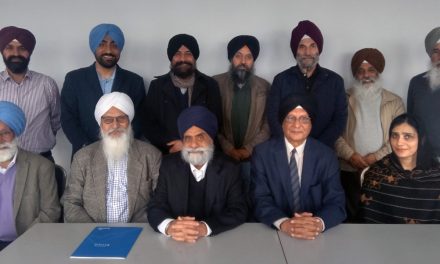It was a typical dark and rainy winter evening in London the first time I met the late and enigmatic Ram Narayan Kumar. We met for pizza in one of his regular haunts and it was the first time that I can remember being starry eyed. This man, born into a life of privilege, rejected all the comforts provided by that environment. Instead, he committed to the betterment of the lives of the oppressed, and fought for equality and justice for all. I vividly recollect listening to him speak over that memorialised dinner, with overflowing passion about the state of human rights in the South Asian subcontinent. And all I could think was “wow, you truly are a modern day Guru Nanak”. That dinner was one of those moments I knew I would reminisce and relive many many times throughout my life. I was in the presence of greatness.
My interactions with Ram Narayan Kumar started many years before that pizza dinner, during my undergraduate degree. I had finally decided to research the events of 1984, rather than rely on what I was being told. I was blessed with my parent’s library and their dedicated 1984 shelf – a collection of sources gathered over their many years fighting for justice, and through a commitment that they made to ensure their children will never forget that year and its impact on the collective Sikh spirit. But my parents stated I’d need to reach out to the community to collate more up-to-date sources. My numerous efforts to reach out to Gurdware and ‘community leaders’ led to two people returning responses. Ram Narayan Kumar was the first. I explored with him and my parents, my incredulity at the lack of responses I had received from our community. Neither my parents nor Ram were particularly surprised, highlighting but not delving on experiences they had of the negative impact of community politics on the fight for justice. It was my first indication that perhaps the current model of the campaign – expecting a community to unite in its fight to end impunity and remember those who were killed or in subsequent years, disappeared, needed to change. Being in my idealistic youth, it took many more years and much more experience to accept that.
Years later I took my first trip to India to work with a couple of NGOs working on human rights and sustainable development projects in Punjab. I was packed off with words of warning from parents weary from years of fighting an oppressive state; to be careful, keep quiet about my work, and head to Anandpur Sahib if anything goes wrong. These words were meaningless to my naïve self until I was accosted by a sevadar in Darbar Sahib about a month after arriving, warning me to stop the work I was doing – which included speaking to people about the extrajudicial disappearances in Punjab. A few weeks later, I caught a rickshaw to the quiet residential streets near Khalsa College with butterflies fluttering while I knocked at an unassuming door. For all the rock stars I have met, it was speaking to the amazingly humble Paramjit Kaur Khalra that remains the second time I remember being starry eyed. Of all her wonderful words which I memorised, I still recall her saying “when people go to the SGPC and ask about the disappearances, they tell them “Go to Bibi Khalra’s house.” They’re not interested in the names of the disappeared nor of keeping the records.” And so the trip which was to instil passion and a connection with Punjab, started to challenge my preconceptions of those whose duty I thought it was to fight for the survivors and victims of 1984 and proceeding years. Did we have the right campaign strategy as a community? And what should we as individuals take ownership of?
This feeling was heightened due to the disparity that remains between the families of the disappeared in Punjab. I remember an interview carried out in an impoverished village in Punjab by an NGO called Voices for Freedom, with the mother of one of the disappeared. She lived in a tiny house without very much, having lost all potential breadwinners in a traditionally patriarchal community. She revealed the difficulties she had faced since her son’s disappearance and revealed the conflicted relationship she had with the campaign for justice. It reminded me of the powerful resounding words of Charity Kondile. During the South African Truth and Reconciliation Commission, Charity Kondile spoke of the kidnapping, torture and murder of her son at the hands of the police. She was asking the court to identify all of the perpetrators in her son’s killing and try them for the crime. When Dirk Coetzee, the leader of the group of officers who killed her son asked for her forgiveness, she refused, responding “It is easy for [Nelson] Mandela and [Desmond] Tutu to forgive … they lead vindicated lives. In my life nothing, not a single thing, has changed since my son was burnt by barbarians … nothing. Therefore I cannot forgive.” [Antjie Krog (1997), ‘The Parable of the Bicycle’, Mail and Guardian]
As the years pass, and as the campaign for justice continues, it is true that some move on and stop fighting. I remember the comments of Ram and my parents, highlighting the negative impact of our community politics on the ongoing battle, and conclude that people leaving may not be so bad. Especially when amazing but under-resourced organisations like ENSAAF are continuing the much needed work of the giants who preceded us. But perhaps we now need to re-evaluate the future of the campaign, and how we support and resource it. Let’s learn from the Zapatista movement, and mobilise international support from the like-minded outside our community, instead of hoping or expecting every Sikh to continue the fight just because they are Sikh. Let’s continue the work of the greats before us, learning how you widen the circle of campaigners from the anti-apartheid movement, rather than expecting a varied community such as ours to be one, and to be the ones to win the fight just because we all follow the teachings of our amazing Gurus. Let’s emulate the sustained efforts of the Mothers of the Plaza de Mayo, who fought tirelessly for their disappeared, rather than take intermittent efforts every June and November which make us feel better but do not advance our movement. Let’s mobilise new social movements beyond our community and engage people who can really add their weight and influence to our campaign at a global level, allowing the driftwood to pass. Let’s stand on the shoulders of the giants before us: the Ram Narayan Kumars, the Paramjit Kaur and Jaswant Singh Khalras, and continue individual activism without the expectation that our community will be on board. Let’s accept that it’s time for a new approach.





